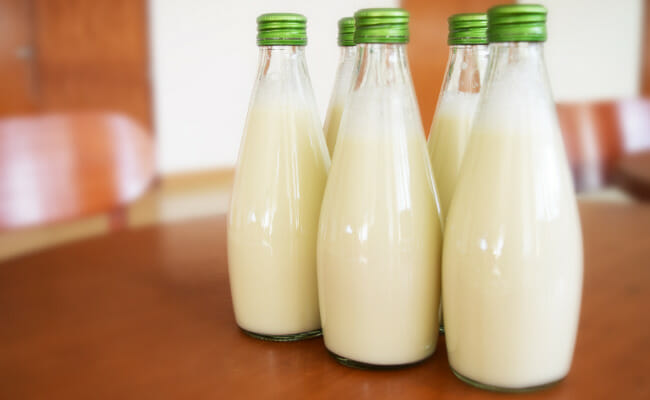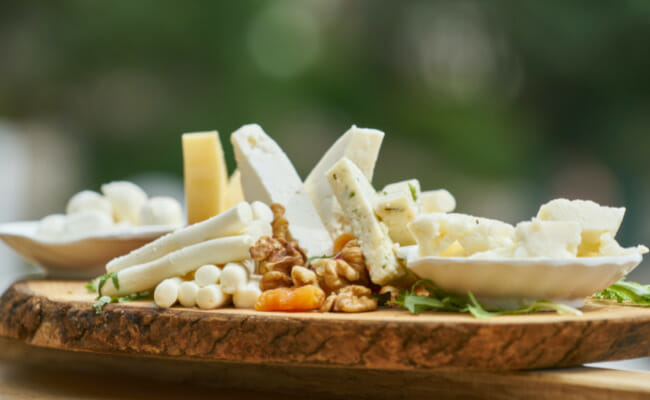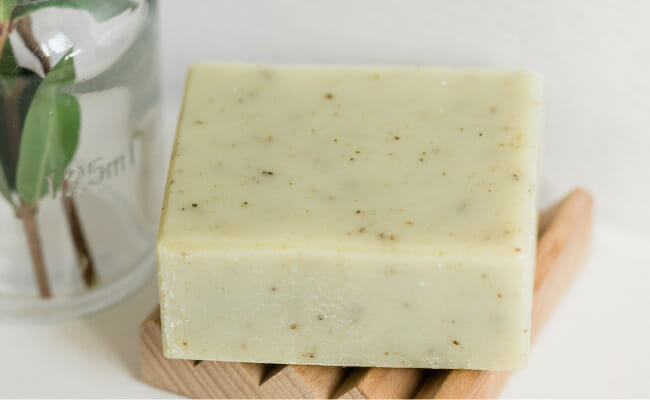Goat Milk: Fully Explained, Benefits and Facts
Move over, cow’s milk. There is a rising demand for goat’s milk these days, and it’s not just from those who are lactose intolerant. More and more people want alternative healthy milk to drink and are now looking towards nutrient-rich goat milk.
Compared to cow’s milk, goat’s milk makes up 2% of the world’s supply. India, Bangladesh, Sudan, and Pakistan are the world’s top producers. France, Spain, and the Netherlands are also big on goat’s milk production.
Experts in nutrition and health sciences are amazed by its nutritional value and health benefits. Let’s get to know more about the health benefits of goat milk.
The healthy goodness of goat milk

Many Americans recognize the high value of goat milk composition it brings to one’s diet. Goat’s milk is packed with vitamins and contains protein and beneficial fatty acids. This type of milk product actually has a slightly higher amount of health-giving nutrients than cow milk. You will also find essential minerals like calcium, magnesium, phosphorus, selenium, etc. Compared to plant-based milk, it has higher amounts of protein, fats, and calcium per cup (8 ounces).
Drinking goat’s milk is a good alternative for those with dairy allergies who cannot drink cow’s milk. Being lactose intolerant shouldn’t stop you from enjoying milk. There are safe and healthy options like plant milk. Almond milk and soy milk are suitable for those who have lactose intolerance.
While very nutritious, goat milk is generally not recommended for infants and young children. This dairy product has inadequate amounts of folic acid and vitamin C for these younger children, who lack fully developed digestive systems and have special nutritional requirements. Human breast milk is still the number one milk best suited for infants and young children.
Impressive health benefits of goat milk
Though many still prefer cow milk, goat milk has impressive advantages and nutritional value. You might want to consume this type of dairy product to experience health goodness. Read on:
Goat milk helps in weight loss
For those who want to lose weight and avoid weight gain, goat’s milk is an easy solution. Though it has higher fatty acids, it has more healthy fats and promotes healthy digestion. Drink milk, eat a balanced diet, and exercise. This will help you avoid unhealthy weight gain and even lose weight.
It helps reduce inflammation.
Want to be kinder to your stomach? Consume goat milk instead of cow’s milk, and you won’t experience stomach discomfort or inflammation. This product has a particular enzyme composition that reduces intestinal irritation.
It helps promote nutrient absorption.
The chemical composition of goat milk is far more similar to human milk than cow milk, which is one of its key advantages. Because human and this kind of milk is comparable, our bodies can absorb more nutrients from the milk as it passes through our bodies. This kind of dairy product also puts less strain on our digestive systems than cow’s milk.
Goat helps in optimizing or supporting better digestion
The use of goat’s milk as a substitute for cow’s milk has skyrocketed as more and more people are taking goat milk to promote better digestion.
Goat milk helps strengthen bones.
One thing in common among plant-based milk like hemp, almond, flax, or animal-based milk is its rich calcium content. Goat’s milk contains a high amount of calcium. Calcium helps promote solid and sturdy bones and prevent osteoporosis.
Healthy milk helps promote a healthy cardiovascular system.
Goat milk contains approximately twice as many medium chain fatty acids as cow milk, indicating that its use won’t negatively affect our cholesterol levels. Drinking it can prevent atherosclerosis, stroke, and heart attacks. You can also maintain a healthy balance of essential fatty acids in the human body. The high potassium levels in this type of milk also aid in lowering blood pressure due to potassium’s function as a vasodilator that relaxes blood vessels and eases pressure on the cardiovascular system. Keeping fit with a healthy diet and exercise can also help lower high blood cholesterol.
Goat milk helps promote and strengthen your immune system
Goat milk has a more significant amount of selenium in its nutritional composition than the commonly consumed cow’s milk. Selenium plays an essential role in the immune system’s ability to fight off infections and keep us healthy.
It helps increase your metabolism.
You don’t need to drink much goat’s milk to get the same vitamin intake as you would from cow’s milk, because goat’s milk is more nutrient-dense than cow’s milk. Nearly 40% of our daily calcium needs, 20% of our vitamin B intake, and a sizeable portion of potassium and phosphorus may all be met in one cup. Additionally, studies have demonstrated that this dairy product can aid the absorption of iron and copper in our digestive tract. As such, it is crucial for those who battle anemia and other conditions.
Goat milk helps support the protection of the environment.
Cows frequently have extreme flatulence due to their digestive nature. Unfortunately, flatulence produces methane gas which is destructive to the environment. Switching to goat milk will lower the demand for cow’s milk, leading to lower emission of methane gas contributing to global warming. More milk production will benefit both the environment and our future generations.
Different types of dairy products

Photo Credit: Pexels.com
There has been an increasing demand for goat milk products as an alternative to cow milk products. One of the most popular processed goat milk foods is goat cheese. There are over 100 kinds of goat cheese around. Cheese types like feta, blue cheese, ricotta, camembert, and brie are popular. It is also added to make creamy soups and decadent sauces.
Like cow milk, raw goat milk can also be made into creamy butter, yogurt, buttermilk, condensed milk, ice cream, and sour cream. Raw milk is also used in candies, pudding, caramel, and other sweet desserts. More recently, raw milk has been incorporated into baking, cooking, and even overnight oats recipes.
From food to skin care products
Besides its use in food, goat milk can also be used in skincare and cosmetic products, giving it an edge in versatility over cow milk.
Goat milk has been used in beauty regimens dating back to the time of Cleopatra in 15-30 BC. The queen of Egypt would add goat’s milk to her luxurious baths to keep her skin youthful and supple. Ancient Egyptians also created a ‘soap’ with animal and vegetable oil and alkaline salts. This soap-like material was used to treat skin ailments and for bathing.
The quest for the skin care products that provide the most health benefits continues to thrive today. The US has the most lucrative skin care market. In general, skin care products are pretty diverse. They vary from soaps and shampoos to skin cleansers, creams, toners, and many more.
Goat milk soap and its healthy nutrients
Goat milk soap is made through the saponification process. Its saturated fat content makes it ideal for a creamy and healthy goat milk soap. This type of milk in its natural form is rich in vitamins and minerals.
- It contains a high amount of alpha hydroxy acids (AHA), such as lactic acid, for gentle exfoliation of dead skin cells.
- High in B group vitamins such as riboflavin, niacin, B6, and B12 -are the building blocks of good skin health.
- Vitamin A has anti-aging and reparative properties.
- High in vitamin C for bright, refreshed skin.
- High in vitamin D for softer skin with reduced lines and wrinkles.
- High in selenium which supports the skin’s natural membrane barrier.
- Zinc, copper, and iron help promote healthy-looking skin.
How to make goat milk soap
Making goat milk soap uses the same process as making regular or traditional soaps. The process is saponification, which combines acid, fats, and oils with a lye base. Combining sodium hydroxide and water produces lye. Regular soaps have lye through the fusion of sodium hydroxide and water. However, when making goat milk soap, lye is made using goat milk instead of water. The naturally occurring fats present in this dairy product produce a creamier consistency.
This dairy product contains saturated and unsaturated fats. Its rich fatty content makes this dairy product highly suitable for soap production.
The role of naturally occurring fats is essential. Saturated fats increase the lathering ability or bubble-making ability. Goat milk soap’s moisturizing and nourishing properties come from unsaturated fats. Adding coconut or olive oil to this soap production is a plus value, adding more healthy fat content.
Differences between regular soap and goat milk soap
Regular soap comprises animal fat or vegetable oil and sodium hydroxide. The combination of fats and lye usually results in the skin becoming scaly and dry after use. It may also contain parabens or sulfates that can leave skin dry or irritated.
In contrast, this dairy product and lye are the main ingredients of goat milk soap. The healthy bar contains minerals such as selenium, vitamin A, and zinc. Its natural antibacterial properties help keep your skin clean and free from bacteria.
The pH Level
The regular soap’s pH is around 9, which is more alkaline than acidic. A high alkaline content can cause your skin to dry as it removes any oil on the surface. The pH level of goat milk soap is around 6.5-7.5, which is more acidic than alkaline. With a lower pH level, it will not dry out your skin. Besides, this type of soap is also hypoallergenic, leaving out harsh chemicals.
Mineral Content
The standard soap bar has high mineral content. While cleansing your skin of dirt, these minerals can also dry out your skin. Goat milk soap contains fewer minerals like selenium, zinc, and vitamin A which help improve overall skin health.
Lye Content
Regular soap uses sodium hydroxide, a harsh chemical that causes dryness and irritation. Lye is a natural element that is found in soaps. Lye won’t harm the skin and helps nourish your skin.
Moisturizer
Regular soap strips off any moisture on your skin and does not keep your skin hydrated. In contrast, this soap helps to lock in moisture, leaving your skin smooth long after your bath.
Health benefits of goat milk soap
Using goat milk as your beauty regimen is beneficial to your skin.
Mild cleanser
Regular soaps have harsh surfactants that can remove natural moisture and oils, leaving skin feeling dry and tight. Goat milk soap has high amounts of fats, specifically caprylic acid. It removes without stripping the skin’s natural fatty acids.
Nutrient-rich
Goat milk has fatty acids and cholesterol, which comprise a large portion of the skin membrane. Without these components, this could result in dryness and irritation. In addition, it is high in vitamin A which has anti-aging properties. Its selenium content helps maintain healthy skin.
It may help improve dry skin surface
You may experience dry skin or xerosis. For dry skin to improve, rehydrating the lipid levels is needed. Goat milk soap has high cholesterol and fatty acid levels, which may help replace missing fats while providing moisture for better water retention.
Natural skin exfoliant

Photo Credit: Pexels.com
Milk soap from goats contains compounds that may help exfoliate your skin. It has lactic acid, a mild AHA that gently removes the top layer of dead skin cells. Alpha-hydroxy acids (AHAs) treat various skin conditions, such as scars, age spots, and hyperpigmentation, due to their natural ability to exfoliate.
Helps maintain a healthy skin microbiome state
The goat milk-based soap can help support a healthy skin microbiome — the collection of beneficial bacteria on your skin’s surface. Due to its gentle dirt-removing properties, don’t strip your skin’s natural lipids or healthy bacteria. Maintaining the skin’s microbiome improves its barrier against pathogens, potentially preventing skin conditions like acne and eczema.
Helps prevent acne
Goat milk soap has lactic acid that helps prevent and control skin blemishes like acne. Lactic acid is a natural exfoliant that removes dead skin cells and keeps skin clean. When this happens, it helps prevent acne. Though, the treatment of acne is not the same for everybody. See your dermatologist to ensure you use the right product for acne treatment.
With more and more people raving about its skin health benefits, this soap’s popularity will continue to increase. Initially, a few small companies handcrafted this healthy soap. This kind of soap has finally earned its well-deserved spot on more extensive retail shelves and online.
Final thoughts
Goat milk has recently taken the world by storm, even among other cow’s milk alternatives like almond milk. Considering the benefits of this dairy produce and its contribution to dairy science and food production, why don’t you give drinking goat milk a try? Whether you have lactose intolerance or simply want an alternative to cow’s milk – make a move, drink up and live a healthier life.





